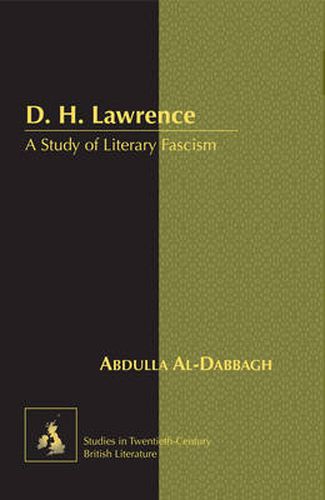Readings Newsletter
Become a Readings Member to make your shopping experience even easier.
Sign in or sign up for free!
You’re not far away from qualifying for FREE standard shipping within Australia
You’ve qualified for FREE standard shipping within Australia
The cart is loading…






This title is printed to order. This book may have been self-published. If so, we cannot guarantee the quality of the content. In the main most books will have gone through the editing process however some may not. We therefore suggest that you be aware of this before ordering this book. If in doubt check either the author or publisher’s details as we are unable to accept any returns unless they are faulty. Please contact us if you have any questions.
This book is an analysis of the social and political outlook of D.H. Lawrence as determined by the development and conflict of the social forces of his time. It discusses, specifically, the relationship between Lawrence’s ideas, as an essayist and novelist, and the ruling ideology of imperialism, reaching the conclusion that Lawrence refused to face and oppose capitalist reality. He either escaped into an imaginary, anarchic utopia, or, more frequently, criticized capitalist relationships from the standpoint of a fascist, militaristic division into rulers and mob, aristocrats and plebeians. Lawrence’s letters during the First World War provide the documents that reveal the genesis of his fascist outlook. The book also traces Lawrence’s attitude towards socialism throughout his literary career and concludes that anti-socialism, with varying intensity, remained an essential part of his outlook. Certain assumptions, like a contempt for man as a social being and the existential division of human beings into higher and lower creatures - into the average and the exceptional - that were basic to his outlook, are shown to be the determining factors in the writing of Lawrence’s novels. The book ends with an analysis of the historical roots of the reactionary intelligentsia and discusses Lawrence’s relationships with the various cultural and ideological trends of his time, dealing also with the different tactics used by the critics to hide the true nature of his political ideas.
$9.00 standard shipping within Australia
FREE standard shipping within Australia for orders over $100.00
Express & International shipping calculated at checkout
This title is printed to order. This book may have been self-published. If so, we cannot guarantee the quality of the content. In the main most books will have gone through the editing process however some may not. We therefore suggest that you be aware of this before ordering this book. If in doubt check either the author or publisher’s details as we are unable to accept any returns unless they are faulty. Please contact us if you have any questions.
This book is an analysis of the social and political outlook of D.H. Lawrence as determined by the development and conflict of the social forces of his time. It discusses, specifically, the relationship between Lawrence’s ideas, as an essayist and novelist, and the ruling ideology of imperialism, reaching the conclusion that Lawrence refused to face and oppose capitalist reality. He either escaped into an imaginary, anarchic utopia, or, more frequently, criticized capitalist relationships from the standpoint of a fascist, militaristic division into rulers and mob, aristocrats and plebeians. Lawrence’s letters during the First World War provide the documents that reveal the genesis of his fascist outlook. The book also traces Lawrence’s attitude towards socialism throughout his literary career and concludes that anti-socialism, with varying intensity, remained an essential part of his outlook. Certain assumptions, like a contempt for man as a social being and the existential division of human beings into higher and lower creatures - into the average and the exceptional - that were basic to his outlook, are shown to be the determining factors in the writing of Lawrence’s novels. The book ends with an analysis of the historical roots of the reactionary intelligentsia and discusses Lawrence’s relationships with the various cultural and ideological trends of his time, dealing also with the different tactics used by the critics to hide the true nature of his political ideas.